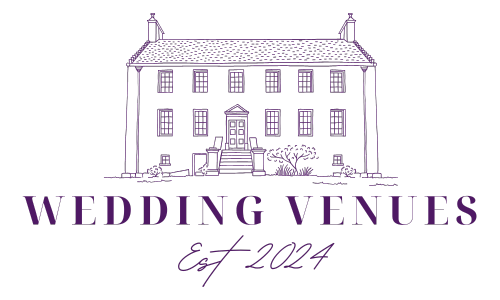Legal Marriage Requirements Spain | Planning a destination wedding in Spain is a dream for many couples, and it’s easy to see why. From sun-soaked coastlines to romantic rustic venues, Spain offers breathtaking settings for weddings. But while the scenery and hospitality are second to none, navigating the legalities can be more complex than anticipated. Whether you’re dreaming of a civil ceremony, a religious union in a historic church, or a symbolic celebration on the beach, it’s essential to understand Spain’s legal framework. The country has specific laws about who can marry, where, and how, especially for foreign couples. These requirements differ depending on your nationality, residency status, and the type of ceremony you want.
Civil Wedding Requirements in Spain
 A civil wedding in Spain is the most straightforward option if you’re looking for a legally recognised marriage with no religious element. These ceremonies are conducted by a public official, such as a judge or mayor, and are legally binding under Spanish law. However, for foreign couples, civil weddings in Spain are not always simple to arrange. The process involves proving eligibility, gathering specific legal documents, translating and legalising paperwork, and following strict application timelines. One of the biggest hurdles is that at least one partner must be a Spanish resident or citizen. Unlike some other countries, Spain doesn’t offer tourist weddings or same-day civil marriages for non-residents. This section walks you through the step-by-step process of what’s required for a civil wedding in Spain – from residency criteria to applying for a marriage licence and understanding where the ceremony can legally take place. It’s important to start this process early and stay organised.
A civil wedding in Spain is the most straightforward option if you’re looking for a legally recognised marriage with no religious element. These ceremonies are conducted by a public official, such as a judge or mayor, and are legally binding under Spanish law. However, for foreign couples, civil weddings in Spain are not always simple to arrange. The process involves proving eligibility, gathering specific legal documents, translating and legalising paperwork, and following strict application timelines. One of the biggest hurdles is that at least one partner must be a Spanish resident or citizen. Unlike some other countries, Spain doesn’t offer tourist weddings or same-day civil marriages for non-residents. This section walks you through the step-by-step process of what’s required for a civil wedding in Spain – from residency criteria to applying for a marriage licence and understanding where the ceremony can legally take place. It’s important to start this process early and stay organised.
![]() Residency Rules: At least one partner must be legally resident in Spain or a Spanish citizen to marry in a civil ceremony. If neither partner meets this criterion, a civil marriage will not be permitted. Spanish law generally requires a minimum of two years’ residency for at least one partner.
Residency Rules: At least one partner must be legally resident in Spain or a Spanish citizen to marry in a civil ceremony. If neither partner meets this criterion, a civil marriage will not be permitted. Spanish law generally requires a minimum of two years’ residency for at least one partner.
![]() Legal Documents Needed: Couples must provide official documents such as valid passports, long-form birth certificates, proof of single status, and, if applicable, divorce or death certificates. A Certificate of No Impediment may also be required.
Legal Documents Needed: Couples must provide official documents such as valid passports, long-form birth certificates, proof of single status, and, if applicable, divorce or death certificates. A Certificate of No Impediment may also be required.
![]() Translations and Apostilles: Documents not originally issued in Spanish must be officially translated by a sworn translator and legalised with an apostille stamp.
Translations and Apostilles: Documents not originally issued in Spanish must be officially translated by a sworn translator and legalised with an apostille stamp.
![]() The Application Process: Once documents are gathered, couples apply at the local Civil Registry Office. Both partners must attend in person, and an interview or brief hearing is often required.
The Application Process: Once documents are gathered, couples apply at the local Civil Registry Office. Both partners must attend in person, and an interview or brief hearing is often required.
![]() Timelines: Civil wedding preparation should begin 6 to 12 months in advance due to document validity limits and the time required for approval.
Timelines: Civil wedding preparation should begin 6 to 12 months in advance due to document validity limits and the time required for approval.
![]() Venue for Civil Ceremonies: These must be held in licensed venues, typically Town Halls or official municipal buildings. Outdoor or villa weddings are not permitted unless specially authorised.
Venue for Civil Ceremonies: These must be held in licensed venues, typically Town Halls or official municipal buildings. Outdoor or villa weddings are not permitted unless specially authorised.
Religious Wedding Requirements (Catholic Church Weddings)
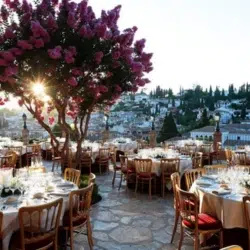 If you’re dreaming of a traditional church wedding, a Catholic ceremony in Spain may be a perfect choice. Spain is a predominantly Catholic country, and its churches provide stunning backdrops steeped in centuries of religious history. The Catholic Church holds a unique position in Spain, and unlike many other countries, Catholic weddings can be both religiously and legally recognised – meaning there’s no need to have a separate civil ceremony. However, while this route is popular with international couples, it still involves a detailed application process and religious prerequisites. You’ll need to be baptised, free to marry under Church law, and willing to undergo pre-marital preparation. What makes Catholic weddings appealing is that they are open to foreigners and don’t require Spanish residency, but you must follow both Church and state processes to ensure legal registration. This section explains the legal and spiritual requirements, timelines, and documentation needed for a Catholic wedding in Spain.
If you’re dreaming of a traditional church wedding, a Catholic ceremony in Spain may be a perfect choice. Spain is a predominantly Catholic country, and its churches provide stunning backdrops steeped in centuries of religious history. The Catholic Church holds a unique position in Spain, and unlike many other countries, Catholic weddings can be both religiously and legally recognised – meaning there’s no need to have a separate civil ceremony. However, while this route is popular with international couples, it still involves a detailed application process and religious prerequisites. You’ll need to be baptised, free to marry under Church law, and willing to undergo pre-marital preparation. What makes Catholic weddings appealing is that they are open to foreigners and don’t require Spanish residency, but you must follow both Church and state processes to ensure legal registration. This section explains the legal and spiritual requirements, timelines, and documentation needed for a Catholic wedding in Spain.
![]() Catholic Ceremony Legality: A Catholic ceremony can be legally binding if at least one partner is a baptised Catholic with no impediments (e.g., prior marriages not annulled). There are no residency requirements, making it suitable for international couples.
Catholic Ceremony Legality: A Catholic ceremony can be legally binding if at least one partner is a baptised Catholic with no impediments (e.g., prior marriages not annulled). There are no residency requirements, making it suitable for international couples.
![]() Church Requirements: Required documentation includes baptism certificates, proof of First Communion and Confirmation, and a letter of freedom to marry. Premarital counselling or courses are also mandatory.
Church Requirements: Required documentation includes baptism certificates, proof of First Communion and Confirmation, and a letter of freedom to marry. Premarital counselling or courses are also mandatory.
![]() Process and Timeline for Catholic Weddings: Begin the process at least 6–12 months in advance. Coordination between your local parish and the Spanish church will be required.
Process and Timeline for Catholic Weddings: Begin the process at least 6–12 months in advance. Coordination between your local parish and the Spanish church will be required.
![]() Catholic vs Civil Ceremony Experience: Catholic weddings are typically held in historic churches and follow traditional Mass formats. They can be bilingual or conducted in English if a suitable priest is available.
Catholic vs Civil Ceremony Experience: Catholic weddings are typically held in historic churches and follow traditional Mass formats. They can be bilingual or conducted in English if a suitable priest is available.
![]() Other Religions: Spain does recognise weddings conducted by other religions, but unless the officiant is licensed and the marriage is civilly registered, they are not automatically valid.
Other Religions: Spain does recognise weddings conducted by other religions, but unless the officiant is licensed and the marriage is civilly registered, they are not automatically valid.
Symbolic Ceremonies in Spain (Non-Legal Weddings)
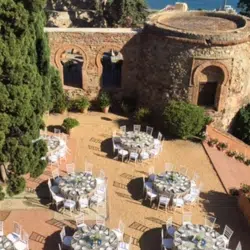 For many international couples, especially those who don’t meet Spain’s legal or religious marriage requirements, symbolic weddings offer the ideal alternative. These non-binding ceremonies are purely celebratory and are not recognised by Spanish law. However, they provide total freedom in terms of location, language, and structure, allowing couples to fully personalise their big day without the pressure of legal documentation or residency rules. Symbolic weddings are often indistinguishable in appearance from legal ones, with professional celebrants, meaningful vows, and all the traditional elements. Most couples will handle the legal side of marriage separately, either before or after the celebration, often in their home country. This approach is stress-free and practical, especially for couples who want to host their dream ceremony in Spain without navigating complex paperwork or waiting periods. From beach weddings at sunset to rustic finca celebrations in the countryside, symbolic weddings offer limitless possibilities with far fewer constraints.
For many international couples, especially those who don’t meet Spain’s legal or religious marriage requirements, symbolic weddings offer the ideal alternative. These non-binding ceremonies are purely celebratory and are not recognised by Spanish law. However, they provide total freedom in terms of location, language, and structure, allowing couples to fully personalise their big day without the pressure of legal documentation or residency rules. Symbolic weddings are often indistinguishable in appearance from legal ones, with professional celebrants, meaningful vows, and all the traditional elements. Most couples will handle the legal side of marriage separately, either before or after the celebration, often in their home country. This approach is stress-free and practical, especially for couples who want to host their dream ceremony in Spain without navigating complex paperwork or waiting periods. From beach weddings at sunset to rustic finca celebrations in the countryside, symbolic weddings offer limitless possibilities with far fewer constraints.
![]() No Legal Requirements: Symbolic weddings have no documentation or residency requirements, making them easy to arrange for any couple.
No Legal Requirements: Symbolic weddings have no documentation or residency requirements, making them easy to arrange for any couple.
![]() Freedom of Venue and Officiant: You can host your ceremony anywhere – beach, villa, mountain – and have it led by a celebrant, friend, or family member.
Freedom of Venue and Officiant: You can host your ceremony anywhere – beach, villa, mountain – and have it led by a celebrant, friend, or family member.
![]() Why Couples Choose Symbolic: This option avoids paperwork stress and is ideal for couples who prefer to focus on the celebration rather than the formalities.
Why Couples Choose Symbolic: This option avoids paperwork stress and is ideal for couples who prefer to focus on the celebration rather than the formalities.
![]() Remember the Legal Bit: Couples must still register their marriage legally in their home country before or after the symbolic wedding in Spain.
Remember the Legal Bit: Couples must still register their marriage legally in their home country before or after the symbolic wedding in Spain.
![]() Paperwork for Symbolic: None is required in Spain. However, bring your legal marriage certificate from your home country for your records.
Paperwork for Symbolic: None is required in Spain. However, bring your legal marriage certificate from your home country for your records.
Civil vs. Religious vs. Symbolic: Key Differences
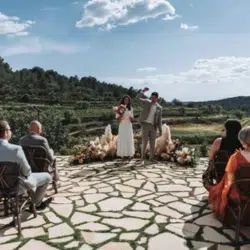 Choosing the right type of ceremony in Spain involves more than just picking a beautiful venue, it affects your entire planning process, from documentation and timing to who can legally officiate your wedding. There are three primary types of ceremonies in Spain: civil, religious (primarily Catholic), and symbolic. Each has distinct legal implications, venue restrictions, and eligibility criteria. Civil weddings are government-recognised but restricted to residents or citizens. Catholic weddings are also legally valid but are only available to practising Catholics who meet Church criteria. Symbolic weddings, by contrast, are not legally binding but offer the greatest flexibility for couples wanting a stress-free celebration in a dream location. Understanding these differences is essential for avoiding confusion, planning your timeline, and ensuring that your marriage is valid both in Spain and in your home country. Below is a quick comparison to help you decide which route is best suited to your circumstances.
Choosing the right type of ceremony in Spain involves more than just picking a beautiful venue, it affects your entire planning process, from documentation and timing to who can legally officiate your wedding. There are three primary types of ceremonies in Spain: civil, religious (primarily Catholic), and symbolic. Each has distinct legal implications, venue restrictions, and eligibility criteria. Civil weddings are government-recognised but restricted to residents or citizens. Catholic weddings are also legally valid but are only available to practising Catholics who meet Church criteria. Symbolic weddings, by contrast, are not legally binding but offer the greatest flexibility for couples wanting a stress-free celebration in a dream location. Understanding these differences is essential for avoiding confusion, planning your timeline, and ensuring that your marriage is valid both in Spain and in your home country. Below is a quick comparison to help you decide which route is best suited to your circumstances.
![]() Legal Recognition: Civil and Catholic ceremonies are legally recognised in Spain and abroad. Symbolic ceremonies are not.
Legal Recognition: Civil and Catholic ceremonies are legally recognised in Spain and abroad. Symbolic ceremonies are not.
![]() Eligibility Requirements: Civil weddings require residency; Catholic weddings require proof of faith and freedom to marry. Symbolic weddings are open to all.
Eligibility Requirements: Civil weddings require residency; Catholic weddings require proof of faith and freedom to marry. Symbolic weddings are open to all.
![]() Documents & Process: Civil and Catholic weddings require official paperwork, translations, and applications. Symbolic weddings do not.
Documents & Process: Civil and Catholic weddings require official paperwork, translations, and applications. Symbolic weddings do not.
![]() Ceremony Venue and Format: Civil – government buildings; Catholic – churches; Symbolic – anywhere you choose.
Ceremony Venue and Format: Civil – government buildings; Catholic – churches; Symbolic – anywhere you choose.
![]() Language: Civil and Catholic ceremonies are conducted in Spanish, while symbolic ceremonies can be in any language.
Language: Civil and Catholic ceremonies are conducted in Spanish, while symbolic ceremonies can be in any language.
![]() After the Wedding: Legal weddings result in a Spanish marriage certificate. Symbolic ceremonies do not require legal registration in Spain.
After the Wedding: Legal weddings result in a Spanish marriage certificate. Symbolic ceremonies do not require legal registration in Spain.
Regional Considerations Across Spain
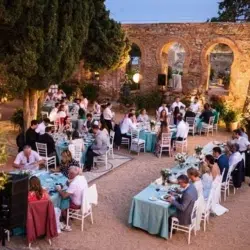 While Spanish marriage law is national, the administrative processes and language preferences can vary considerably from one region to another. Each autonomous community may have slightly different procedures for submitting documents, booking ceremony dates, and dealing with translations. Some areas offer more flexibility than others, and processing times can depend on the local office’s workload. Popular wedding destinations like Marbella, Barcelona, and Seville tend to have busy civil registries, so booking early is essential. In contrast, smaller towns or rural areas may process paperwork more quickly but might require additional help with translations if English is not widely spoken. You’ll also encounter regional languages such as Catalan, Basque, or Valencian in official forms, though you can request documents in Castilian Spanish. In some regions, couples can expedite the civil process by using a local notary rather than the civil registry. Understanding these local nuances can save time and frustration, so planning ahead is key.
While Spanish marriage law is national, the administrative processes and language preferences can vary considerably from one region to another. Each autonomous community may have slightly different procedures for submitting documents, booking ceremony dates, and dealing with translations. Some areas offer more flexibility than others, and processing times can depend on the local office’s workload. Popular wedding destinations like Marbella, Barcelona, and Seville tend to have busy civil registries, so booking early is essential. In contrast, smaller towns or rural areas may process paperwork more quickly but might require additional help with translations if English is not widely spoken. You’ll also encounter regional languages such as Catalan, Basque, or Valencian in official forms, though you can request documents in Castilian Spanish. In some regions, couples can expedite the civil process by using a local notary rather than the civil registry. Understanding these local nuances can save time and frustration, so planning ahead is key.
![]() Language of Paperwork: In regions with co-official languages (e.g., Catalonia, Basque Country), documents may be in the local language. You can request Castilian Spanish versions.
Language of Paperwork: In regions with co-official languages (e.g., Catalonia, Basque Country), documents may be in the local language. You can request Castilian Spanish versions.
![]() Where to Apply: Civil Registry Offices handle applications, but in some areas, you can apply through the Town Hall or a notary.
Where to Apply: Civil Registry Offices handle applications, but in some areas, you can apply through the Town Hall or a notary.
![]() Timing and Workload: Popular wedding destinations such as Marbella, Barcelona, and Seville may have longer processing times. Smaller towns may be faster and more flexible.
Timing and Workload: Popular wedding destinations such as Marbella, Barcelona, and Seville may have longer processing times. Smaller towns may be faster and more flexible.
![]() Andalusia: Follows standard national rules but may require translation in smaller villages. Catholic weddings are coordinated via local dioceses.
Andalusia: Follows standard national rules but may require translation in smaller villages. Catholic weddings are coordinated via local dioceses.
![]() Catalonia: Forms may be in Catalan, but the legal process is the same. Beautiful public venues in Barcelona require early booking.
Catalonia: Forms may be in Catalan, but the legal process is the same. Beautiful public venues in Barcelona require early booking.
![]() Other Regions: In places like Madrid or the islands, notaries can help speed up the process. Always check with the local office where you intend to marry.
Other Regions: In places like Madrid or the islands, notaries can help speed up the process. Always check with the local office where you intend to marry.
Practical Tips for Planning Your Legal Wedding in Spain
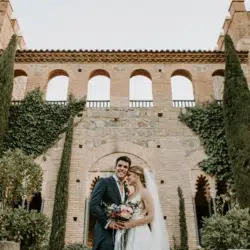 Planning a wedding abroad can feel overwhelming, especially when legalities are involved. The key to a successful wedding in Spain is preparation, patience, and a little expert help. Understanding which type of ceremony is right for you, legal, religious, or symbolic, will set the course for everything else. From there, it’s all about gathering documents early, checking timelines, and ensuring translations and apostilles are handled well in advance. Many couples find it helpful to enlist a wedding planner or legal consultant familiar with Spanish bureaucracy. Whether you’re navigating residency requirements, coordinating with a parish, or simply trying to avoid unnecessary stress, having someone on the ground can make a huge difference. If you’re opting for a symbolic wedding, focus on creating the perfect celebration while handling the legal registration in your home country. Whatever path you choose, thoughtful preparation will ensure your big day goes smoothly and is truly unforgettable.
Planning a wedding abroad can feel overwhelming, especially when legalities are involved. The key to a successful wedding in Spain is preparation, patience, and a little expert help. Understanding which type of ceremony is right for you, legal, religious, or symbolic, will set the course for everything else. From there, it’s all about gathering documents early, checking timelines, and ensuring translations and apostilles are handled well in advance. Many couples find it helpful to enlist a wedding planner or legal consultant familiar with Spanish bureaucracy. Whether you’re navigating residency requirements, coordinating with a parish, or simply trying to avoid unnecessary stress, having someone on the ground can make a huge difference. If you’re opting for a symbolic wedding, focus on creating the perfect celebration while handling the legal registration in your home country. Whatever path you choose, thoughtful preparation will ensure your big day goes smoothly and is truly unforgettable.
Decide on Legal vs. Symbolic Early: Your choice affects everything from venue booking to documentation. If opting for legal, start early.
Use a Wedding Planner or Get Expert Help: A local expert can help navigate bureaucracy, liaise with offices, and secure all the correct documents.
Prepare Documents Methodically: Create a checklist and ensure all documents are translated and legalised. Keep multiple copies.
![]() Mind the Timelines: Many documents have expiry periods. Work backward from your wedding date to ensure everything is ready on time.
Mind the Timelines: Many documents have expiry periods. Work backward from your wedding date to ensure everything is ready on time.
![]() Consider a Local Civil Ceremony at Home: Many couples marry legally at home and enjoy a symbolic ceremony in Spain.
Consider a Local Civil Ceremony at Home: Many couples marry legally at home and enjoy a symbolic ceremony in Spain.
![]() Legalising a Spanish Marriage Back Home: Obtain multiple certified copies of your marriage certificate and get them translated or apostilled if needed.
Legalising a Spanish Marriage Back Home: Obtain multiple certified copies of your marriage certificate and get them translated or apostilled if needed.
![]() Destination Wedding Practicalities: Plan trips for paperwork, interviews, and ensure guests are aware of any required attendance dates.
Destination Wedding Practicalities: Plan trips for paperwork, interviews, and ensure guests are aware of any required attendance dates.
![]() Stay Supportive and Patient: Bureaucracy can be slow, but with persistence, organisation, and a supportive partner, you’ll make it through together.
Stay Supportive and Patient: Bureaucracy can be slow, but with persistence, organisation, and a supportive partner, you’ll make it through together.
Work with Wedding Venues ES
If you would like any further information about the legal requirements for getting married in Spain, our team at Wedding Venues ES is here to help. We understand that planning a destination wedding can be overwhelming, especially when it comes to paperwork, timelines, and venue regulations. Whether you need guidance on civil or religious ceremonies, or you’re considering a symbolic celebration, we’re happy to answer your questions and support you through the process. We also offer a full range of wedding planning services, from venue sourcing and coordination to catering and entertainment. To find out more or to speak with a member of our friendly team, please don’t hesitate to get in touch, we’re just a message away.

